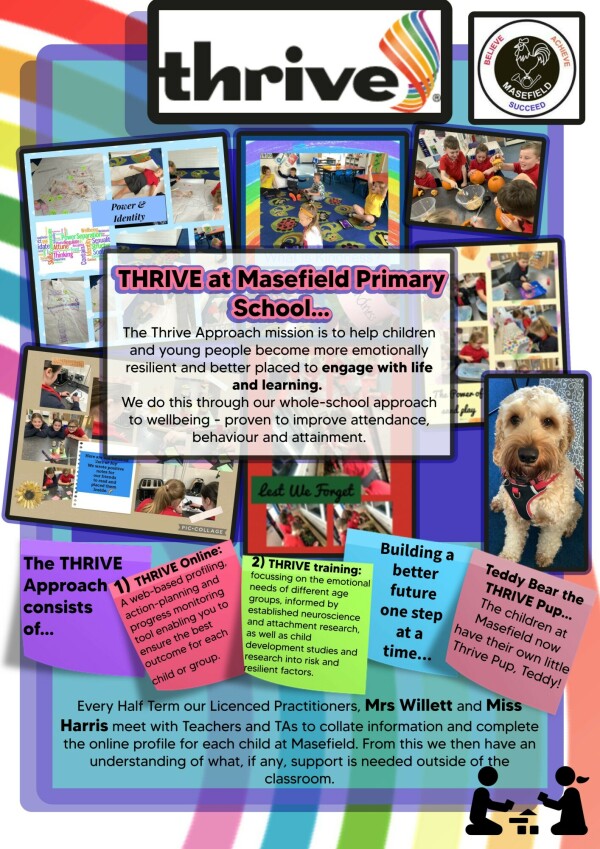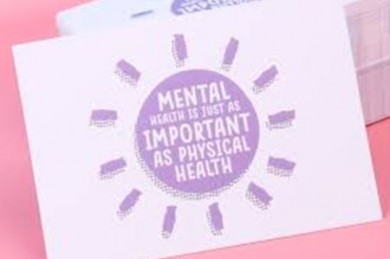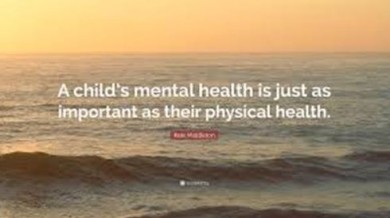Learning & Curriculum
Mental Health and Wellbeing
At Masefield, supporting the mental health and wellbeing of our whole school community including pupils, staff and parents/carers is at the heart of what we do. We have agreed that wellbeing is a state of being comfortable, healthy and happy. We know that everyone experiences life challenges that can make us vulnerable and at times, anyone may need additional emotional support. Everyone has a role to play in promoting positive health and wellbeing across school. Children, staff and parent/carers are encouraged to talk about their feelings and to ask for help when they need it.
For all of us at Masefield, our first priority is to care for every child in a secure, friendly environment enabling them to enjoy their time in school and feel confident to learn. In order to maintain this ethos, the staff team work together to support children’s emotional and social learning, we maintain this attitude during lesson times, break times and through all activities that take place throughout the day to make sure our children feel secure in school. This method is called the Thrive Approach.

Not all children can put their needs into words every time they experience a different emotion, but the way children behave can tell us a lot about how they are feeling. The Thrive Approach draws on the latest research – from current neuroscience, recent attachment research, current studies of effective learning and current models of child development – in order to help our school to understand the needs being signalled by children’s behaviour. It gives us targeted strategies and activities to help them re-engage with learning and life.
Unfortunately, (like all of us at some point in our lives), children may face challenges that knock them off course. What is needed then is understanding and support to get them back on track. Many children will respond to the care, understanding and support given by parents, family, friends and teachers. However, some children need a little bit extra to enable them to:
-
Feel good about themselves
-
Know that they matter
-
Become more resilient and resourceful
-
Have a positive place in society
-
Form trusting, rewarding relationships
-
Be creative
-
Be compassionate and empathetic
-
Be thoughtful and self-aware
-
Be productive
-
Be able to overcome difficulties and setbacks
Children who need a little bit of extra help are identified through a variety of ways such as our whole-class screening process, by class teachers, or through communication with families. For some children there may be an obvious reason why they need a bit of extra support. This might be bereavement, family break down or an identified medical condition such as ADHD. For others, there can be no obvious trigger to why they are finding some aspects of school and/or home life difficult. Working closely with parents and class teachers, our Thrive team carry out full assessments of identified children’s social, emotional and behavioural needs. This helps us to build a bespoke Thrive Action Plan of activities to support their needs.
A Thrive Action Plan is plan of activities tailored to support a child’s identified social and emotional learning targets. The activities are carried out one-to-one and in small groups, they are play and arts-based activities designed to help the child feel better about himself; become more resilient and resourceful; form trusting, rewarding relationships; be compassionate and empathetic; and/or be able to overcome difficulties and setbacks. They might include playing in the sand tray, cooking, painting, model making, exploring difficult situations through role-play or comic strips, playing strategy games or projects focusing on the child’s own interests – all dependent on the needs of the individual child. The Action Plans are reviewed regularly so that we can see the progress children have made.
For many children across the school, Thrive time is considered a real treat! Who wouldn’t want to spend half an hour a week with the one-to-one attention of a caring adult doing play activities when the rest of their class are learning? However, we try to emphasise to everyone that Thrive is just like any other learning intervention. If children struggle with reading, writing or maths, we give them extra support, and it’s the same with social and emotional learning, if they are struggling, they get extra support.
At Masefield, we don’t consider Thrive to be an intervention carried out in the Nest area for just a few children, we consider it to be a whole-school approach. We all believe that all behaviour is communication and that communication needs to be understood and supported – not “dealt” with. Thrive feeds into everything we do; celebration assemblies, getting to know everyone and their families, sharing all achievements – not just academic ones, celebrating our diversity and individuality.

 As a school, we are keen to support and help look after the mental health of parents/carers. We have carried out a number of activities this year to promote wellbeing and we have more planned for the next academic year.
As a school, we are keen to support and help look after the mental health of parents/carers. We have carried out a number of activities this year to promote wellbeing and we have more planned for the next academic year. We are keen to ensure emotional wellbeing remains high profile in our school and we are working towards reducing the stigma around mental health. The children take part in a number of activities to help promote good wellbeing and mental health including:
We are keen to ensure emotional wellbeing remains high profile in our school and we are working towards reducing the stigma around mental health. The children take part in a number of activities to help promote good wellbeing and mental health including: